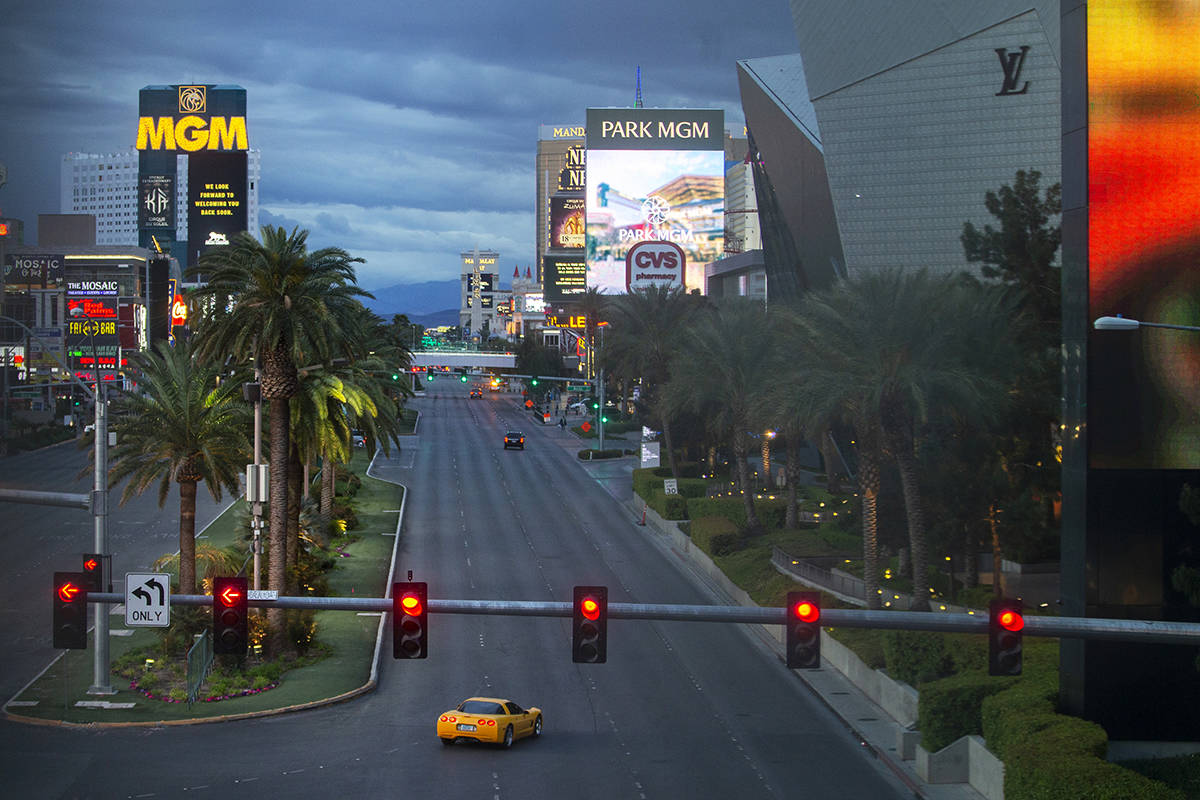Culinary union: State casino reopening guidelines don’t go far enough
The culinary union says the state Gaming Control Board’s casino reopening guidelines are inadequate and has issued its own six-page list of health and sanitation guidelines for gaming facilities.
In a videoconference Tuesday, union leaders also vowed to “call out” regulators, government officials and casino companies that fall short of their expectations.
“There can be no shortcuts,” said D. Taylor, international president of UNITE HERE, the umbrella organization over Culinary Local 226 in Nevada. “There can be no volunteerism by companies to do the right thing. This has to be mandated in the strongest possible terms.”
The guidelines of the union, which says 95 percent of its 300,000 workers in several states are out of work, emphasize prevention, protection, enhanced cleaning protocols with Centers for Disease Control and Prevention standards and regulatory enforcement.
Among the requirements listed by the union are that guests should be offered surgical masks and asked to wear them while in public areas; that contactless and cashless tipping systems for guest service providers — such as bellpersons, valets, doorpersons, guest-room attendants and room service attendants — should be provided; and that all fitness centers, spas and pools remain closed.
Wynn plan praised
Taylor praised the reopening plan of Wynn Resorts Ltd. — but said it still fell short of what’s necessary — and blasted remarks made by Las Vegas Mayor Carolyn Goodman.
“There has to be state or municipality enforcement and mandates,” Taylor said. “We have seen already, for example, the mayor of Las Vegas essentially say, ‘Just open it up. We’ll see what happens,’ like we’re rats in a lab. So we can’t rely on examples of politicians like this.”
Taylor said gaming regulators across the country have the ability to dictate what standards are set for a casino reopening.
“If that is not used, then I think every public official who’s responsible for the gaming control board should be scrutinized and, frankly, be held accountable if workers and guests become affected because we have not taken steps necessary to protect the workers and the public from the coronavirus pandemic,” he said.
Taylor encouraged regulators to make casinos’ reopening plans public as Wynn Resorts has. He said union contracts guarantee employees a safe working environment.
“That’s great for us,” Taylor said. “But this is not just about us. This is about all the workers in the hospitality industry. Why would they (regulators) keep this confidential?”
Confidential plans
On Monday, Gaming Control Board Chairwoman Sandra Morgan said in a text that plans “will be confidential,” citing state statutes. “But some licensees are choosing to make them public,” she said. “We are not approving every plan.”
Taylor disagreed.
“Let’s be transparent,” he said. “We’re transparent. We’re telling you about our protocols. Why wouldn’t every company do that? I applaud what Wynn did. They made that a public document, good, bad or indifferent. We think it’s obviously very good overall. Let everybody do that.”
Representatives for Wynn Resorts did not respond to a request for comment on the union’s remarks.
Morgan had no comment on the other culinary union criticisms.
MGM Resorts International, which is expected to release its detailed reopening plan in the days ahead, said it would work with the union and the company’s philosophy would be safety first.
“We are providing masks and requiring thermal temperature checks and screening for all employees working at MGM Resorts, and that will remain our policy as we continue to reopen,” MGM spokesman Brian Ahern said. “When we release our comprehensive health and safety plan in the coming days, it will be clear that we are putting health and safety at the center of our operations. The plan includes PPE guidelines, social distancing and enhanced cleaning protocols. Employees will receive training and support as they work to operate in the new environment where safety is put first. We have and will continue to engage with the union on safety in the workplace.”
Source of recommendations
Taylor said the list of guidelines came primarily from public health organizations.
“These things did not come out of our thin air,” he said.
Other highlights from the recommendations:
— Each facility should establish detailed written procedures for implementing these guidelines. Such procedures should be supplied to all personnel in the language they are most comfortable with and to their bargaining representatives.
— Each facility should maintain an adequate stock of personal protective equipment and should distribute such equipment at no cost to employees.
— All employees should be offered employer-paid tests to determine their current and past COVID-19 status. Tests should be provided with sufficient time for employees to receive results before they are scheduled to return to work. Employers should contract with third-party organizations able to generate baseline statistics of past and present COVID-19 status across the workplace and should provide such statistics to employees and their bargaining representatives to the maximum extent permitted by law. Once an employee has been cleared to return to work by a health professional, the employer shall promptly return that employee to his or her previous position.
— If COVID-19 has been detected at any time during the preceding 14 days in the state or province where the facility is located, no employee should be compelled to accept work. Any employee electing not to accept work should be considered to be on involuntary layoff. Employers should not challenge applications for unemployment benefits by employees subject to such involuntary layoff. Such employees should be permitted to return to work at any time according to regular scheduling practice.
— No employee should be disciplined or retaliated against for refusing work they believe poses a risk to themselves or others or for reporting work conditions that they believe may be unsafe.
— Guests should be asked to keep 6 feet of separation from anyone who is not traveling with them. Guests should be offered surgical masks and asked to wear them while in public areas and guests should not touch doors entering the facility. Doors should either be propped open, should open automatically, or should be opened by a doorperson.
Contact Richard N. Velotta at rvelotta@reviewjournal.com or 702-477-3893. Follow @RickVelotta on Twitter.











































